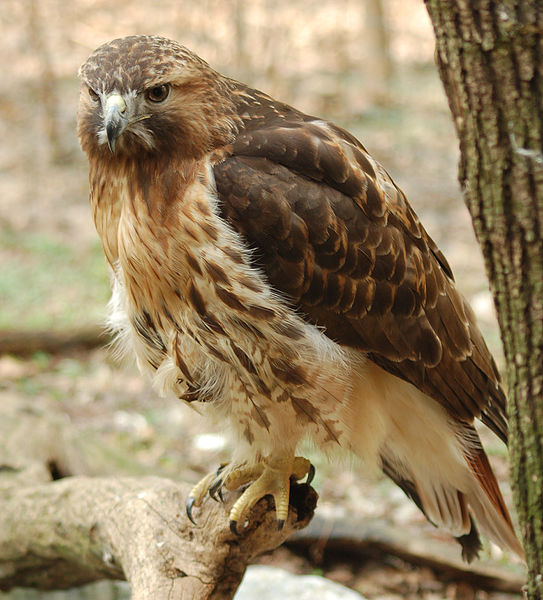While this is not the actual hawk I saw, it is a fair representation. I felt intrusive enough observing the bird feed.
To me, birds of prey are the most majestic. There is an inherent power and intensity in a bird of prey that is beautiful and intoxicating. While I watched the bird I was struck by the thought off how tragic it would be if animals like this were no longer common in nature. It was a beautiful depiction of the natural order of things starkly contrasted by the surrounding buildings in which we are educated on abstract topics, many of human invention. There is often a large disconnect between our everyday lives and nature. Sometimes we are swept up in the semi-chaos of civilization and forget about nature all together.
Little things, like seeing a bird of prey feeding on its prey can be enough to ground us and remind us to respect and revere the natural world that we all come from, and the ways in which it has been corrupted. I think now of a letter, sent by Chief Seattle of the Dwamish Tribe to President Pierce in 1855 which states a whole hosts of things far more eloquently than I ever could:
THE GREAT CHIEF in Washington sends word that he wishes to buy our land. The Great Chief also sends us words of friendship and good will. This is kind of him, since we know he has little need of our friendship in return. But we will consider your offer, for we know if we do not so the white man may come with guns and take our land. What Chief Seattle says you can count on as truly as our white brothers can count on the return of the seasons. My words are like the stars - they do not set.
How can you buy or sell the sky - the warmth of the land? The idea is strange to us. Yet we do not own the freshness of the air or the sparkle of the water. How can you buy them from us? We will decide in our time. Every part of this earth is sacred to my people. Every shining pine needle, every sandy shore, every mist in the dark woods, every clearing, and every humming insect is holy in the memory and experience of my people.
We know that the white man does not understand our ways. One portion of land is the same to him as the next, for he is a stranger who comes in the night and takes from the land whatever he needs. The earth is not his brother, but his enemy, and when he has conquered it, he moves on. He leaves his father's graves and his children's birthright is forgotten. The sight of your cities pains the eyes of the redman. But perhaps it is because the redman is a savage and does not understand.
There is no quiet place in the white man's cities. No place to listen to the leaves of spring or the rustle of insect wings. But perhaps because I am a savage and do not understand - the clatter only seems to insult the ears. And what is there to life if a man cannot hear the lovely cry of the whippoorwill or the arguments of the frogs around a pond at night? The Indian prefers the soft sound of the wind itself cleansed by a mid-day rain, or scented by a pinõn pine: The air is precious to the redman. For all things share the same breath - the beasts, the trees, and the man. The white man does not seem to notice the air he breathes. Like a man dying for many days, he is numb to the stench.
If I decide to accept, I will make one condition. The white man must treat the beasts of this land as his brothers. I am a savage and I do not understand any other way. I have seen thousands of rotting buffaloes on the prairie left by the white man who shot them from a passing train. I am a savage and do not understand how the smoking iron horse can be more important than the buffalo that we kill only to stay alive. What is man without the beasts? If all the beasts were gone, men would die from great loneliness of spirit, for whatever happens to the beast also happens to the man.
All things are connected. Whatever befalls the earth befalls the sons of the earth.

No comments:
Post a Comment